Home | Category: Moses / Moses
MOSES'S EARLY LIFE
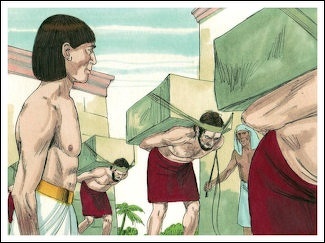
After Joseph's death, which brought an end to the Age of Abraham and the Early Biblical Patriarchs, the Children of Israel were enslaved by the Egyptians. Among these Hebrew slaves was Moses. He was raised by the pharaoh's daughter, who found him as an infant among reeds in the Nile, where his mother had hid him from the Egyptian soldiers ordered to kill every Israelite male infant. Even though Moses was brought up as an Egyptian prince, he sympathized with the plight of his people. On one occasion he witnessed an Egyptian slavemaster about to kill a Hebrew slave, and intervened and killed the Egyptian. After that Moses was forced to flee Egypt. He found refuge in the desert where God appeared to him in a burning bush and ordered Moses to return to Egypt and demand the pharaoh to set the Children of Israel free. .[Source: Paul Mendes-Flohr Worldmark Encyclopedia of Religious Practices, 2000s, Encyclopedia.com]
Moses’s Parents and Siblings: Levi's grandson, Amram, the son of Kehot, married Jochebed, and she bore him three children. Their first child was a girl by the name of Miriam, who was later to become a great prophetess of the Jewish people. The second child was Aaron, the highest priest of God, famous for his extraordinary love of peace. Next to his brother Moses, he was the greatest leader of our nation in his time. Moses was Amram's youngest child. [Source: chabad.org]
When Moses was three, one episode of his story goes, he snatched the crown off the Pharaoh's head. Dumbfounded, the Pharaoh decided to devise a test to see if Moses realized what he had done. Two plates were placed before the child: one with gold and one with red-hot coals. If he chose the gold one he was to be put to death. If he chose the one with coals he would be spared as "one without knowledge of his acts." Fortunately for him he grabbed the hot one, but unfortunately he stuck it in his mouth and seared his tongue, leaving him with halting speech.☼
Websites and Resources: Bible and Biblical History: Bible Gateway and the New International Version (NIV) of The Bible biblegateway.com ; King James Version of the Bible gutenberg.org/ebooks ; Bible History Online bible-history.com ; Biblical Archaeology Society biblicalarchaeology.org ; Judaism Virtual Jewish Library jewishvirtuallibrary.org/index ; Judaism101 jewfaq.org ; torah.org torah.org ; Chabad,org chabad.org/library/bible ; Internet Jewish History Sourcebook sourcebooks.fordham.edu Christianity: BBC on Christianity bbc.co.uk/religion/religions/christianity ; Christian Classics Ethereal Library www.ccel.org ; Sacred Texts website sacred-texts.com ; Internet Ancient History Sourcebook: Christian Origins sourcebooks.fordham.edu ; Biblical Images: Bible in Pictures creationism.org/books ; Bible Blue Letter Images blueletterbible.org/images ; Biblical Images preceptaustin.org
RECOMMENDED BOOKS AND FILMS:
“Moses: A Life” by Jonathan Kirsh Amazon.com ;
“Great Lives: Moses: A Man of Selfless Dedication” by Charles R. Swindoll, Maurice England, et al. Amazon.com ;
“Moses: In the Footsteps of the Reluctant Prophet” by Adam Hamilton Amazon.com ;
“Moses and Monotheism” by Sigmund Freud Amazon.com ;
“Gregory of Nyssa: The Life of Moses” (HarperCollins Spiritual Classics Amazon.com ;
“Ten Commandments” (film, DVD by Cecil B. DeMille, with Charleston Heston) Amazon.com ;
“Prince of Egypt” (Dreamworks animation with the voice of Moses supplied by Val Kilmer and his friend Ramses by Ralph Fiennes) Amazon.com
Enslavement of the Jews in Egypt According to the Bible
Exodus 1:1 Now these are the names of the children of Israel, which came into Egypt; every man and his household came with Jacob. 1:2 Reuben, Simeon, Levi, and Judah, 1:3 Issachar, Zebulun, and Benjamin, 1:4 Dan, and Naphtali, Gad, and Asher. 1:5 And all the souls that came out of the loins of Jacob were seventy souls: for Joseph was in Egypt already. 1:6 And Joseph died, and all his brethren, and all that generation. 1:7 And the children of Israel were fruitful, and increased abundantly, and multiplied, and waxed exceeding mighty; and the land was filled with them. [Source: King James Version of the Bible, gutenberg.org]
1:8 Now there arose up a new king over Egypt, which knew not Joseph. 1:9 And he said unto his people, Behold, the people of the children of Israel are more and mightier than we: 1:10 Come on, let us deal wisely with them; lest they multiply, and it come to pass, that, when there falleth out any war, they join also unto our enemies, and fight against us, and so get them up out of the land.
1:11 Therefore they did set over them taskmasters to afflict them with their burdens. And they built for Pharaoh treasure cities, Pithom and Raamses. 1:12 But the more they afflicted them, the more they multiplied and grew. And they were grieved because of the children of Israel. 1:13 And the Egyptians made the children of Israel to serve with rigour: 1:14 And they made their lives bitter with hard bondage, in morter, and in brick, and in all manner of service in the field: all their service, wherein they made them serve, was with rigour.
Moses and the Pharaoh's Daughter
Ancient Egyptian records show that the Pharaoh’s palaces had nurseries where royal children were educated. There is evidence that foreign children were brought into these nurseries so it follows that the Pharaoh's daughter bringing an infant such as baby Mose into one of these nurseries is not totally out of the question. [Source: BBC |::|]
The Bible claims that Moses was rescued by the Pharaoh's daughter, who adopted him. He was then educated and brought up in the palace as a prince. Egyptologist Jim Hoffmeier told the BBC: “The picture we have here is very authentic because the young boys in ancient Egypt were under a tough master. In fact we have the testimony of some of the scribes who talked about how their scribe master beat them when they were lazy and made sure they wrote their letters right...“Of course we have no proof but what's interesting is that during the general period we place Moses, during this time non-royal children were also introduced. The royal children of foreign kings, kings from Canaan, Syria, were entered into this institution to learn how to read and write.”
Moses Flees Egypt for Killing an Egyptian Who Assaulted a Jewish Slave
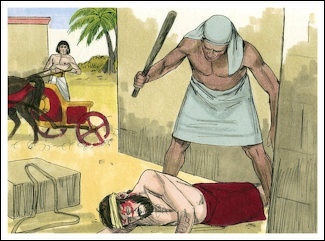
Moses witnesses a slave being beaten
Reacting to the unfair treatment of his people, Moses murdered an Egyptian guard who was abusing a Jewish slave and was forced to flee Egypt and and the wrath of the Pharaoh to the Sinai. According to the Torah, "And he spied an Egyptian smiting a Hebrew, one of his brethren. And he looked this way and that way, when he saw there was no man, he slew the Egyptian, and hid him in the sand." If he hadn't committed this crime it seems plausible that he would have had a distinguished career in the Pharaoh's court.
Exodus 2:11 And it came to pass in those days, when Moses was grown, that he went out unto his brethren, and looked on their burdens: and he spied an Egyptian smiting an Hebrew, one of his brethren. 2:12 And he looked this way and that way, and when he saw that there was no man, he slew the Egyptian, and hid him in the sand. [Source: King James Version of the Bible, gutenberg.org]
2:13 And when he went out the second day, behold, two men of the Hebrews strove together: and he said to him that did the wrong, Wherefore smitest thou thy fellow? 2:14 And he said, Who made thee a prince and a judge over us? intendest thou to kill me, as thou killedst the Egyptian? And Moses feared, and said, Surely this thing is known.
2:15 Now when Pharaoh heard this thing, he sought to slay Moses. But Moses fled from the face of Pharaoh, and dwelt in the land of Midian: and he sat down by a well. 2:16 Now the priest of Midian had seven daughters: and they came and drew water, and filled the troughs to water their father's flock. 2:17 And the shepherds came and drove them away: but Moses stood up and helped them, and watered their flock. 2:18 And when they came to Reuel their father, he said, How is it that ye are come so soon to day? 2:19 And they said, An Egyptian delivered us out of the hand of the shepherds, and also drew water enough for us, and watered the flock. 2:20 And he said unto his daughters, And where is he? why is it that ye have left the man? call him, that he may eat bread. 2:21 And Moses was content to dwell with the man: and he gave Moses Zipporah his daughter. 2:22 And she bare him a son, and he called his name Gershom: for he said, I have been a stranger in a strange land.
Moses fled to a land called Midian, in northwest Arabia, east of the Gulf of Aqaba. While in the desert he met his wife Zipporah, daughter of the Midianite priest Jethro, while she was drawing water from a well. Moses stood up for Jethro when other shepherds tried to shoo him away from the well. For this Jethro offered Moses his daughter. She soon bore Moses a son. Moses worked as a shepherd for forty years.This episode has similarities to a story that circulated in the time of Ramses about a courtier named Sunuhe who fled to the desert and lived with some Bedouins after being blamed for the assassination of a Pharaoh.
Moses Flight from Egypt in the Muslim Story
According to Muslim version of the Moses story: “Moses grew up in Pharaoh's household under the benevolent care of the Queen. When he reached manhood, Allah 'gave him the power of knowledge and judgement'. Once, while on a visit to the city, he saw two men fighting; one was an Israelite, the other an Egyptian. The Israelite asked Moses for help, so Moses came to the rescue and struck the Egyptian forcefully. The Egyptian collapsed and died instantly. [Source: BBC, September 4, 2009, jews-for-allah.org |::|]
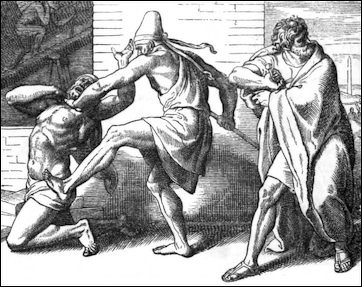
Moses slays the Egyptian
“Moses was most perturbed and asked God for forgiveness, saying, 'I shall never come to the help of those committing wrong.' The next morning, the man he had helped again called out for assistance. Moses realized that he was a quarrelsome person and rushed to lay his hands on him. 'Do you intend to kill me as you had killed the man yesterday?' the man shouted. 'Do you wish to become a tyrant in the land?' “Moses prayed to the Lord. 'Oh, my Lord, save me from such people who are given to wrongdoing.' Then a man came running and informed Moses that Pharaoh's chiefs were planning to hang Moses and advised him to run away.|::|
“So Moses left Egypt in the direction of Madyan, praying to the Lord to guide him to the right path. On reaching the waters of Madyan, he saw a number of men drawing water for their animals, while two women stood by quietly, holding back their animals. Moses asked them why they were waiting. They replied, 'We cannot water our animals until the men have left; that is our misfortune. Our father could not come to draw water for our animals as he is too old.' Moses drew water for both of them, and the women were grateful for his help. One of them went home and informed her father of what Moses had done. The father asked her to fetch Moses so that he might pay him the wages for the work.|::|
“Moses told the old man the circumstances under which he had had to leave Egypt. 'Have no fear any more,' he assured Moses, 'It is good you have escaped from those wicked people.' He was impressed by Moses and offered one of his daughters in marriage, provided Moses promised to live with them for eight years, or even longer if he so wished. Moses agreed and started his life in Madyan.” |::|
Moses and the Burning Bush
One Day while 80-year-old Moses was tending a flock of sheep in the desert near Mt. Sinai, after escaping from Egypt, a bush caught on fire: "And an angel of the Lord appeared unto him in a flame of fire out of the midst of the bush: and he looked, and behold, the bush burned with fire, and the bush was not consumed." From the flames came a voice: "Moses, Moses...I am the God of thy Father, the God of Abraham, the God of Isaac, and the God of Jacob." It was the first time God had spoken to anybody on Earth for over 600 years. "I will send thee unto Pharaoh," the voice continued, "that thou mayest bring forth my people the children of Israel out." ☼
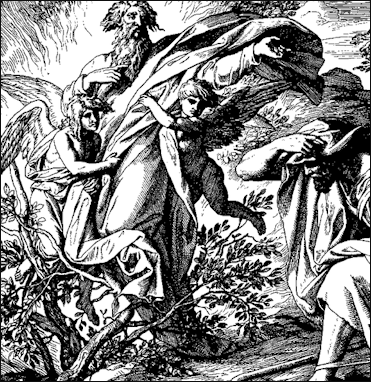 God ordered Moses to go and force the Pharaoh to let his Hebrew people go and lead his people out of slavery in Egypt to the Promised Land. At first Moses hesitated, thinking that the Israelites would not believe he had heard the word of God. He described himself as being "slow of speech, and slow of tongue," which some scholars have interpreted as meaning that Moses had a stammer. He did not promise to do as God wished until God had promised to support him with miracles.God then gave Moses special powers and inspired by this, Moses returned to Egypt and demanded freedom for his people. [Source: BBC]
God ordered Moses to go and force the Pharaoh to let his Hebrew people go and lead his people out of slavery in Egypt to the Promised Land. At first Moses hesitated, thinking that the Israelites would not believe he had heard the word of God. He described himself as being "slow of speech, and slow of tongue," which some scholars have interpreted as meaning that Moses had a stammer. He did not promise to do as God wished until God had promised to support him with miracles.God then gave Moses special powers and inspired by this, Moses returned to Egypt and demanded freedom for his people. [Source: BBC]
Rationalists trying to explain the burning bush story have said that maybe the bush was a kind of desert acacia shrub with brilliantly-colored flowers. Clinton Bailey, an expert on Bedouin folklore told the BBC that believes that hearing the voice of God was perfectly plausible: “If you have to survive out here in this heat and in this desolation... You're closer to God... And I have seen Bedouin praying on their own in the middle of the desert... and when they do pray you get a connection between themselves and Allah, God, which is very very strong and it's like saying 'You up there, help me out, I've got nothing else down here to keep me going except your providence'. [Source: BBC |::|]
The burning bush experience marked a turning point for Moses and the Hebrew people. Jews believe that at the moment the Hebrews forged a special and unique relationship with God. In return, God gave them the right to occupy a certain land — the Promised Land, : the land we now know as Israel. From that moment on, Moses resolved to lead his people out of Egypt to the land of milk and honey.
Moses and the Burning Bush According to the Bible
2:23 And it came to pass in process of time, that the king of Egypt died: and the children of Israel sighed by reason of the bondage, and they cried, and their cry came up unto God by reason of the bondage. 2:24 And God heard their groaning, and God remembered his covenant with Abraham, with Isaac, and with Jacob. 2:25 And God looked upon the children of Israel, and God had respect unto them. [Source: King James Version of the Bible, gutenberg.org]
3:1 Now Moses kept the flock of Jethro his father in law, the priest of Midian: and he led the flock to the backside of the desert, and came to the mountain of God, even to Horeb. 3:2 And the angel of the LORD appeared unto him in a flame of fire out of the midst of a bush: and he looked, and, behold, the bush burned with fire, and the bush was not consumed. 3:3 And Moses said, I will now turn aside, and see this great sight, why the bush is not burnt.
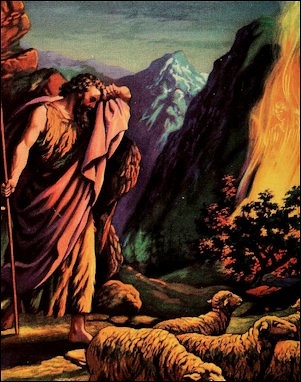
Burning bush
3:4 And when the LORD saw that he turned aside to see, God called unto him out of the midst of the bush, and said, Moses, Moses. And he said, Here am I. 3:5 And he said, Draw not nigh hither: put off thy shoes from off thy feet, for the place whereon thou standest is holy ground. 3:6 Moreover he said, I am the God of thy father, the God of Abraham, the God of Isaac, and the God of Jacob. And Moses hid his face; for he was afraid to look upon God.
3:7 And the LORD said, I have surely seen the affliction of my people which are in Egypt, and have heard their cry by reason of their taskmasters; for I know their sorrows; 3:8 And I am come down to deliver them out of the hand of the Egyptians, and to bring them up out of that land unto a good land and a large, unto a land flowing with milk and honey; unto the place of the Canaanites, and the Hittites, and the Amorites, and the Perizzites, and the Hivites, and the Jebusites.
3:9 Now therefore, behold, the cry of the children of Israel is come unto me: and I have also seen the oppression wherewith the Egyptians oppress them. 3:10 Come now therefore, and I will send thee unto Pharaoh, that thou mayest bring forth my people the children of Israel out of Egypt. 3:11 And Moses said unto God, Who am I, that I should go unto Pharaoh, and that I should bring forth the children of Israel out of Egypt? 3:12 And he said, Certainly I will be with thee; and this shall be a token unto thee, that I have sent thee: When thou hast brought forth the people out of Egypt, ye shall serve God upon this mountain.
3:13 And Moses said unto God, Behold, when I come unto the children of Israel, and shall say unto them, The God of your fathers hath sent me unto you; and they shall say to me, What is his name? what shall I say unto them? 3:14 And God said unto Moses, I AM THAT I AM: and he said, Thus shalt thou say unto the children of Israel, I AM hath sent me unto you.
Burning Bush in the Muslim Story
“After eight years, Moses left with his wife and family. On their journey he saw a fire in the direction of Mount Tur. He made his family halt there, while he ran towards the fire hoping to obtain some information about the neighborhood, or at least get a burning firebrand to keep his family warm.|When Moses reached the spot he heard a voice from above the trees on the right side of the sacred valley. 'What have you in your right hand?' the voice said. Bewildered, Moses replied: 'It is my staff, with which I bring down the leaves for my sheep and do many other things.'“The voice spoke again: O Moses, I am the Lord of the Universe. Cast down your staff and listen to me. [20:19]|::|
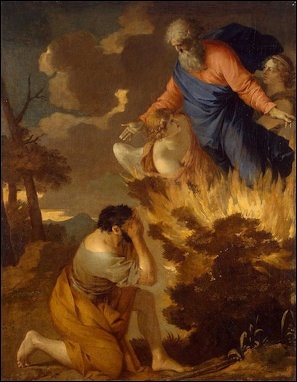
God appearing in the burning bush
“Moses threw it down, and there before his eyes it became a writhing serpent. The Lord spoke again: Draw near it and fear not: now seize the serpent and do not be afraid. It will become a staff again. [20:21] Moses did as he was told. God then asked him to place his right hand into his bosom and to bring it out again; it was shining white and without any stain. God then blessed him with supreme revelations and commanded him to go to Pharaoh and his people and to preach to them the Oneness of God and the glory of righteous conduct.|::|
“Moses prayed to God: Oh my Lord, enlarge my heart and strengthen me by curing my speech so that people may understand what I say. Also lighten my burden by assigning Aaron, my brother, to assist me. [20:25-32] The Lord granted his prayer and asked him to proceed with His Signs: Go, you, O Moses and your brother, with Our Signs to Pharaoh. Speak gently to him but make him see the truth and fear Us. [20:43-44]|::|
“Moses and Aaron told the Lord that Pharaoh might subject them to violence, as Moses was wanted by his chiefs for killing one of their men. The Lord assured them not to have any fear in their hearts: I am with you; I hear and see everything. Tell Pharaoh that you are My messengers. Ask him to let the Israelites be with you, and to torture them no more. [20:46-47]|::|
God Gives Moses Tips On How to Get the Jews Out Egypt
Exodus: 3:15 And God said moreover unto Moses, Thus shalt thou say unto the children of Israel, the LORD God of your fathers, the God of Abraham, the God of Isaac, and the God of Jacob, hath sent me unto you: this is my name for ever, and this is my memorial unto all generations. 3:16 Go, and gather the elders of Israel together, and say unto them, The LORD God of your fathers, the God of Abraham, of Isaac, and of Jacob, appeared unto me, saying, I have surely visited you, and seen that which is done to you in Egypt: 3:17 And I have said, I will bring you up out of the affliction of Egypt unto the land of the Canaanites, and the Hittites, and the Amorites, and the Perizzites, and the Hivites, and the Jebusites, unto a land flowing with milk and honey. [Source: King James Version of the Bible, gutenberg.org]
3:18 And they shall hearken to thy voice: and thou shalt come, thou and the elders of Israel, unto the king of Egypt, and ye shall say unto him, The LORD God of the Hebrews hath met with us: and now let us go, we beseech thee, three days' journey into the wilderness, that we may sacrifice to the LORD our God. 3:19 And I am sure that the king of Egypt will not let you go, no, not by a mighty hand. 3:20 And I will stretch out my hand, and smite Egypt with all my wonders which I will do in the midst thereof: and after that he will let you go.3:21 And I will give this people favour in the sight of the Egyptians: and it shall come to pass, that, when ye go, ye shall not go empty...
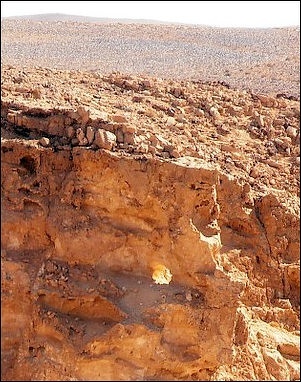
a real flame coming from a bush on Mount Karkon in Negev, Israel
...4:2 And the LORD said unto him, What is that in thine hand? And he said, A rod. 4:3 And he said, Cast it on the ground. And he cast it on the ground, and it became a serpent; and Moses fled from before it. 4:4 And the LORD said unto Moses, Put forth thine hand, and take it by the tail. And he put forth his hand, and caught it, and it became a rod in his hand: 4:5 That they may believe that the LORD God of their fathers, the God of Abraham, the God of Isaac, and the God of Jacob, hath appeared unto thee...
...4:10 And Moses said unto the LORD, O my LORD, I am not eloquent, neither heretofore, nor since thou hast spoken unto thy servant: but I am slow of speech, and of a slow tongue.
4:11 And the LORD said unto him, Who hath made man's mouth? or who maketh the dumb, or deaf, or the seeing, or the blind? have not I the LORD? 4:12 Now therefore go, and I will be with thy mouth, and teach thee what thou shalt say. 4:13 And he said, O my LORD, send, I pray thee, by the hand of him whom thou wilt send. 4:14 And the anger of the LORD was kindled against Moses, and he said, Is not Aaron the Levite thy brother? I know that he can speak well. And also, behold, he cometh forth to meet thee: and when he seeth thee, he will be glad in his heart. 4:15 And thou shalt speak unto him, and put words in his mouth: and I will be with thy mouth, and with his mouth, and will teach you what ye shall do. 4:16 And he shall be thy spokesman unto the people: and he shall be, even he shall be to thee instead of a mouth, and thou shalt be to him instead of God. 4:17 And thou shalt take this rod in thine hand, wherewith thou shalt do signs.
Text Sources: Internet Jewish History Sourcebook sourcebooks.fordham.edu “World Religions” edited by Geoffrey Parrinder (Facts on File Publications, New York); “ Encyclopedia of the World’s Religions” edited by R.C. Zaehner (Barnes & Noble Books, 1959); “Old Testament Life and Literature” by Gerald A. Larue, New International Version (NIV) of The Bible, biblegateway.com; Wikipedia, National Geographic, BBC, New York Times, Washington Post, Los Angeles Times, Smithsonian magazine, Times of London, The New Yorker, Reuters, AP, AFP, Lonely Planet Guides, and various books and other publications.
Last updated March 2024
